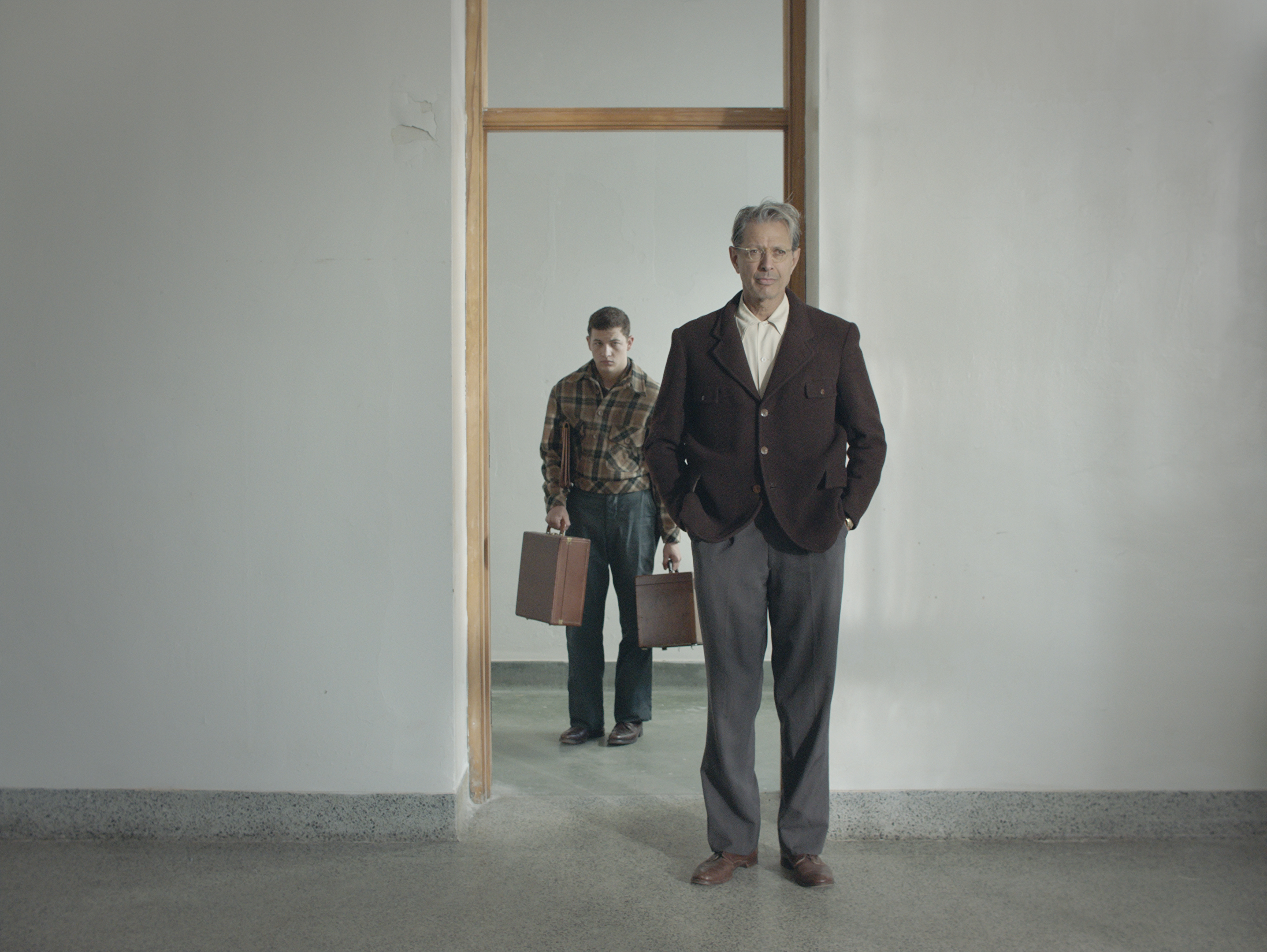Venice Film Review: ‘The Mountain’
By Guy Lodge
LOS ANGELES (Variety.com) – A near-hypnotic pall of strangeness, so opaque as to be genuinely menacing, shadows and disrupts the pristine surfaces of “The Mountain” — and that’s before Denis Lavant shows up to take its derangement into the stratosphere. The fifth and most austerely polished feature to date from American outlier Rick Alverson, this troubling fable about a shiftless young man (Tye Sheridan) falling under the charismatic influence of a rogue lobotomist (Jeff Goldblum) in the 1950s Midwest may take clear stylistic cues from Lanthimos and Lynch, but it’s no mere exercise in oddball arthouse posing: Alverson’s serene affectations serve a stern, stark thesis about our evolving understanding of mental health, as well as America’s dubious romanticization of its heartland.
Sure to prove polarizing on the festival circuit — it’s hard to imagine that Alverson is shooting for anything but — “” should prove enough of a conversation piece to attract highbrow distributor interest, particularly given Goldblum’s recently raised mainstream profile. The star is almost too ideally cast in a more sober spin on his mad-scientist persona, applying signature gonzo tics and phrasing to the role of a brain doctor with more than a few screws loose himself. Having dipped a toe into bigger-name casting with his previous feature “Entertainment,” Alverson experiments intriguingly with performance style here, submitting his otherwise rigorously controlled filmmaking to the whims of unpredictably idiosyncratic thesps like Lavant, Goldblum and Udo Kier. It’s a calculated clash that perhaps reflects the film’s own theme of agitated minds at odds with the stoic status quo.
Holding the center of the film, however, is the shy, stolid young presence of , in his second straight collaboration with the director. As Andy, a physically imposing but unassertive zamboni driver who has grown up cowed by his chilly German figure-skater father Frederick (Kier, who else), Sheridan shuffles across camera with a preternaturally slowed, wounded gait; even his immaculate 1950s workwear (wonderfully designed by Elizabeth Warn) ages him to doleful effect. We’re left to wonder what manner of childhood abuse has disconnected him so; whatever it was, it’s safe to assume his absent mother was also a victim. We come to learn that she’s been abandoned to an institution following a lobotomy at the hands of Dr. Wallace Fiennes (Goldblum). When Frederick abruptly drops dead, Fiennes reappears to the take the lad dubiously under his wing.
Cue a ghoulish cross-country road trip, with Andy appointed as photographer to Fiennes’s tour of middle-American hospitals, administering last-gasp lobotomies to mentally addled patients in the face of modern medicine’s mounting ethical and scientific resistance to the procedure. “The Mountain” captures a country on the brink of greater enlightenment, though still placidly preoccupied with false utopianism: Fiennes claims to be helping people by effectively zombifying them, though whether he truly believes that is a question held aloft in Goldblum’s arch interpretation. Perhaps the film’s driest, most mordant joke is that it’s rather hard to tell the blankly placated victims of Fiennes’s surgery from supposedly “normal” folk: It’s hard not to sense the influence of Yorgos Lanthimos in the cast’s halting, opiated delivery of sparse, nonsequitur-ridden dialogue, but the mollifying alien effect is entirely suited to Alverson’s curdled American dream.
Just as “The Mountain” risks heading into smug shaggy-dog territory, however, it delivers some tonal shock therapy in the charged, contorted form of Denis Lavant as Jack, a demented French alternative healer who requests Fiennes’ mind-numbing services for his daughter Susan (Hannah Gross). As Andy falls for the unfortunate girl, “The Mountain” begins to admit some tenderness in its freeze-dried characters, while its hitherto aimless narrative winds its way toward a kind of bitterly ironic grace — notwithstanding the shrieking, whirling, exhilaratingly demonic exhortations of Lavant, who seemingly plays Jack as a leftover “Holy Motors” persona beamed in from another dimension. (As the actor dips occasionally into incoherent Franglish, it seems implausible that he was working from a script.)
That Alverson’s stiff vision of Americana is most drastically shattered by two outsize foreign characters can’t be an accident, though its perspective on them remains ambiguous: Frederick and Jack are both violent interrupters in their children’s lives, but also possessing extravagant imaginations ill-contained by the white-bread environment in which they have inexplicably found themselves. Frederick’s memorial service, for example, provides the film with its maddest bolt of beauty, as flare-skirted, fan-waving skaters flutter in Busby Berkeley formation around a giant headshot of Kier; Alverson’s occasional, wicked flourishes of high-camp whimsy only underline the dourness of a cruel, clinical world that he otherwise builds with unsentimental determination.
He gets a brilliant assistant in this regard from cinematographer Lorenzo Hagerman, whose wintry-hued compositions — in gorgeously gaunt Academy ratio — leave plenty of headroom for cool air to circulate around the film’s terminally detached characters. Production designer Jacqueline Abrahams (who also brought Lanthimos’s “The Lobster” its cleanly art-directed froideur) is likewise an invaluable architect of mood here: Her unloved domestic interiors and barren hospital wards represent a take on midcentury modernism so aggressively stripped, so free from any evidence of human use, as to take matters into the realm of science fiction. Combined with Hagerman’s studied, often theatrical lighting design, it’s a mise-en-scène that calls the eerily mannered American tableaux of photographer Gregory Crewdson to mind.
Composer Dan Lopatin and sound designer Gene Park’s contributions are similarly entwined, making for a stunningly atonal soundscape of high-frequency whines, echoes and anachronistic electronic blips. It says much for the anti-nostalgic bent of Alverson’s film, however, that its most disquieting musical cue is also its most traditional one: In this universe, the cornball sentiments of folk standard “Home on the Range” play about as harmoniously as a buzzsaw.

